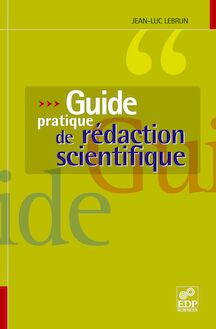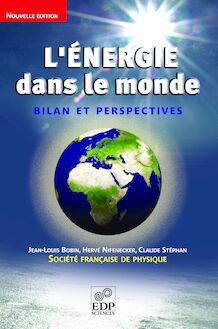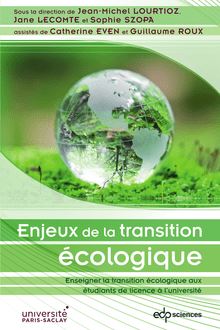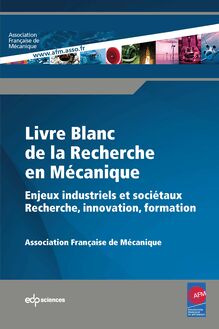-
 Univers
Univers
-
 Ebooks
Ebooks
-
 Livres audio
Livres audio
-
 Presse
Presse
-
 Podcasts
Podcasts
-
 BD
BD
-
 Documents
Documents
-
- Cours
- Révisions
- Ressources pédagogiques
- Sciences de l’éducation
- Manuels scolaires
- Langues
- Travaux de classe
- Annales de BEP
- Etudes supérieures
- Maternelle et primaire
- Fiches de lecture
- Orientation scolaire
- Méthodologie
- Corrigés de devoir
- Annales d’examens et concours
- Annales du bac
- Annales du brevet
- Rapports de stage
La lecture à portée de main
Découvre YouScribe en t'inscrivant gratuitement
Je m'inscrisDécouvre YouScribe en t'inscrivant gratuitement
Je m'inscrisEn savoir plus
En savoir plus

Description
Undoubtedly, the industrialized countries are already facing a major and even existential problem: that of the transition from societies based on the massive use of fossil fuels to societies that have learned to do without them. This will, of necessity, be the real driver of the energy transition that we are talking about so much now! Because it is the future availability of fossil fuels that will give the tempo of this transition, and not the development of other sources of energy, so difficult is the way that remains to be done to these to replace them!
This book aims to provide non-specialists, and those who are concerned by energy transition and climate protection, basic knowledge to better understand the nature of fossil fuels and their importance in the economies of the industrialized countries. The book also explains why their future availability will play a vital role in the future economic and social transformations in these countries.
It consists of two parts that can be read in a largely independent way:
– The first part aims to present the variety of fossil fuels and the physicochemical principles ruling their formation and that of their deposits in the earth’s crust.
– The second part is a discussion on major current issues: What are the remaining fossil fuel reserves? When precisely during this century can we predict the decline of their productions? What consequences will this decline have for industrial societies? What is and what will be their role in climate change? What risks does their use entail for public health?
Sujets
Informations
| Publié par | EDP Sciences |
| Date de parution | 13 janvier 2019 |
| Nombre de lectures | 3 |
| EAN13 | 9782759822324 |
| Langue | English |
| Poids de l'ouvrage | 15 Mo |
Informations légales : prix de location à la page 0,7200€. Cette information est donnée uniquement à titre indicatif conformément à la législation en vigueur.
Extrait
PETROLEUM, NATURAL GAS AND COAL
Bernard Durand
Nature, formation mechanisms, future prospects in the energy transition
Bernard Durand
PETROLEUM,
NATURAL GAS
AND COAL
Nature, formation mechanisms, “as long as the weather is fi ne, the man
does not predict the storm”future prospects in
the energy transition Niccolo MACHIAVELLI
Undoubtedly, the industrialized countries are
already facing a major and even existential
problem: that of the transition from societies based on
the massive use of fossil fuels to societies that have
learned to do without them. This will, of necessity,
be the real driver of the energy transition that we
are talking about so much now! Because it is the
future availability of fossil fuels that will give the
tempo of this transition, and not the development of
other sources of energy, so di cult is the way that
remains to be done to these to replace them!
This book aims to provide non-specialists, and
those who are concerned by energy transition
and climate protection, basic knowledge to bet- PETROLEUM,
ter understand the nature of fossil fuels and their
importance in the economies of the industrialized
countries. The book also explains why their future
availability will play a vital role in the future econo- NATURAL GAS
mic and social transformations in these countries.
It consists of two parts that can be read in a largely
independent way: AND COAL– The rst part aims to present the variety of fossil
fuels and the physicochemical principles ruling
Nature, formation mechanisms, their formation and that of their deposits in the
earth’s crust.
– The second part is a discussion on major cur- future prospects in www .edpsciences.org
rent issues: What are the remaining fossil fuel
reserves? When precisely during this century the energy transitionISBN: 978-2-7598-2231-7 can we predict the decline of their productions?
What consequences will this decline have for
industrial societies? What is and what will be their
role in climate change? What risks does their use
9782759 822317 entail for public health?
9782759822317-Petroleum-COUV.indd 1 02/05/2018 13:00“TITLE” — 2018/3/21 — 16:26 — page i — #1
Petroleum, natural gas and coal
Nature, formation mechanisms, future
prospects in the energy transition
Bernard Durand
EDP Sciences
17, avenue du Hoggar
Parc d‘activités de Courtaboeuf, BP 112
91944 Les Ulis Cedex A, FrancePrinted in France
ISBN (print): 978-2-7598-2231-7 – ISBN (ebook): 978-2-7598-2232-4
All rights relative to translation, adaptation and reproduction by any means whatsoever are
reserved, worldwide. In accordance with the terms of paragraphs 2 and 3 of Article 41 of the
French Act dated March 11, 1957, “copies or reproductions reserved strictly for private use and
not intended for collective use” and, on the other hand, analyses and short quotations for
example or illustrative purposes, are allowed. Otherwise, “any representation or reproduction -
whether in full or in part – without the consent of the author or of his successors or assigns, is
unlawful” (Article 40, paragraph 1). Any representation or reproduction, by any means
whatsoever, will therefore be deemed an infringement of copyright punishable under Articles
425 and following of the French Penal Code.
© EDP Sciences, 2018 “TOC” — 2018/5/3 — 14:48 — page 3 — #1
Contents
The author 5
Preface 7
Foreword 11
Introduction: The importance of fossil fuels for industrial societies 13
Part I Nature and variety of fossil fuels, physico-chemical principles
of their formation and that of their deposits in the earth’s crust 19
Chapitre 1 What are the fossil fuels, and what are they made of? 21
1.1 The oils 21
1.2 The natural gases 24
1.3 The coals 28
1.4 The bituminous shales (oil shales) 29
Chapitre 2 How do fossil fuels form? 33
2.1 Their origin: kerogens, debris of organisms accumulated
in certain sediments 33
2.2 Their sites of formation: sedimentary basins, depressions
of the earth’s crust invaded by the waters 38
2.3 The key to their formation: the thermal history
of kerogen containing sediments 39
3“TOC” — 2018/5/3 — 14:48 — page 4 — #2
Petroleum, natural gas and coal
Chapitre 3 How are their deposits formed? 49
3.1 Fluid fuels: oils and gases 49
3.2 Solid fuels: coals and bituminous (oil) shale 67
Chapitre 4 An overview of fossil fuels 75
Part II Future prospects, climate and health risks 81
Chapitre 1 Some nomenclature 83
1.1 Natural conventional and unconventional oil and gas,
and synthetic oil and gas (synfuels and syngases) 83
1.2 Categories of coals and their use 90
Chapitre 2 Some Quantification 93
2.1 To what depths are deposits of fossil fuels found? 93
2.2 The calorific value of fuels, the source of their
economic interest 96
Chapitre 3 Future prospects of fossil fuels? 101
3.1 A very difficult problem: the evaluation of fossil fuel reserves 101
3.2 What is the future of global fossil fuel production? 116
Chapitre 4 A little Economics: fossil fuel prices 153
4.1 Oil prices 153
4.2 Gas prices 160
4.3 Coal prices 161
4.4 Trends in market shares of primary energies 162
Chapitre 5 Fossil fuels and climate 167
Chapitre 6 Fossil fuels and public health 175
Conclusion 177
Appendix 1: Chemical composition of oils 185
Appendix 2: Dynamics and Resilience of the Production of Shale
Oil and Gas 189
References 193
4“FM” — 2018/4/25 — 15:41 — page 5 — #1
The author
BernardDurandisafossilfuelsgeochemist,formerheadoftheGéologie-Géochimie
Department of the Institut français du pétrole et des énergies nouvelles (IFPEN)
and former director of the École nationale supérieure de géologie (ENSG).
AlfredWegenerAwardoftheEuropeanAssociationofGeoscientistsandEngineers(EAGE).
5“Preface” — 2018/4/25 — 15:43 — page 7 — #1
Preface
We love fossil fuels. We really do. Otherwise, would we spend between 300 and
700 billion dollars each year to find new oil and gas fields, and enhance the capacity
to extract what they contain? Would we protest loudly each time the government
considers to raise taxes on gasoline or domestic fuel oil? Would countries have sent
armies to conquer or protect coal mines, then oilfields, a number of times in the
course of recent history? Would Hitler have invaded Russia if it were not for the
Caucasian oil fields, and would Japan have bombed Pearl Harbor if it were not to
get rid of the US marine and secure a naval route to the Indonesian oil fields?
Actually, we love fossil fuels so much that it is acceptable to say that we are addicted
to them. We can plea to have good reasons to do so, though: their use gave us all
thepleasureswecoulddreamof.Throughfossilfuels,wehaveacquiredthefreedom
to move fast, on the Earth, on the sea or in the air. We got heat in the winter and
coolairinthesummer.Wegotelectricity(70%oftheworldproductioncomesfrom
coal,gasandoil),whichinturngaveusallthedomesticcomfort,andtheplantsthat
manufacture all that we can find in a store.
Fossil fuels also tremendously increased our food production, through the
N-fertilizers made from gas, and the agricultural machinery running on oil. Do
you know that when you eat a kilogram of beef, you kind of eat a kilogram of fossil
fuels, that were used to grow the cereals eaten by the cattle?
They gave us organic chemistry then plastics, steel and cement, and thus all the
buildingsthathaveappearedinthe20thcentury,butalsoclothes(allsyntheticfibers
are oil and gas derivatives), shoes, windows and toys, coffee machines and carpets,
beds and fridges,TV screens and chairs, skis and shampoo, forks and planes, coffee
cups and dishwashers, and of course smartphones and modern communications.
They have also made possible to install everywhere water distribution systems and
sewage,that,togetherwiththeincreaseoffoodsecurity,haveplayedamajorrole-far
7“Preface” — 2018/4/25 — 15:43 — page 8 — #2
Petroleum, natural gas and coal
greater than curative medicine - in tripling our life expectancy between 1800 and
2000.
Actually, fossil fuels gave us everything we see in the modern world. Suppress
them, and we lose computers thus money, transportation thus food – and all the
other goods– in thecities, and theproductivityof work, that ismerely empowering
each of us with machinery that multiplies our mechanical power by hundreds or
thousands.
Thelistisnotfinished:becausetheyallowedatremendousincreaseintheproductivity
ofwork,fossilfuelsalsogaveuslongstudies,vacationsandretirement,theyenabled
to put 80% of the population in cities (because we do not need so many people in
the fields, where they have been replaced by tractors, pesticides and fertilizers), and
they have allowed globalization – because of boats, trucks and planes – and modern
financial markets (that require computers and electricity).
Andallthis,naturehasgivenittousforfree.What,fossilfuelswouldbefree?Indeed,
they are. Just as no one has ever paid a single cent for wind to exist, no one has ever
paid a single cent for oil – or gas, or coal – to exist.This precious resource has been
formedbyMotherNaturewithoutthehelpofanyhuman,withremnantsofancient
life, for hundreds of millions of years. Actually, when the process of oil formation
began, there were not that many humans around to give a helping hand!
The price of oil, today, is only money paid by some humans to other humans: those
that have worked to extract it from the environment, those that have been lucky
enough to sit on the oilfield, and all those that transport it or trade it. But not a
single cent ever went to Nature, that manufactured it.
Anditispreciselybecauseitissomucheasiertoextractenergyfromtheenvironment
– and store it, and transport it, and use it whenever you want – when it is coal, oil
or gas than when it is wood, wind or the run of water that humanity has moved
from a 100% renewable civilization to the present state. It made energy much more
available, both in the physical and in the economic sense.
Wehavenotbecomeaddictedtofossilfuelsjustbecausewearetotalidiots.Wehave
done so because these energies can be
-
 Univers
Univers
-
 Ebooks
Ebooks
-
 Livres audio
Livres audio
-
 Presse
Presse
-
 Podcasts
Podcasts
-
 BD
BD
-
 Documents
Documents
-
Jeunesse
-
Littérature
-
Ressources professionnelles
-
Santé et bien-être
-
Savoirs
-
Education
-
Loisirs et hobbies
-
Art, musique et cinéma
-
Actualité et débat de société
-
Jeunesse
-
Littérature
-
Ressources professionnelles
-
Santé et bien-être
-
Savoirs
-
Education
-
Loisirs et hobbies
-
Art, musique et cinéma
-
Actualité et débat de société
-
Actualités
-
Lifestyle
-
Presse jeunesse
-
Presse professionnelle
-
Pratique
-
Presse sportive
-
Presse internationale
-
Culture & Médias
-
Action et Aventures
-
Science-fiction et Fantasy
-
Société
-
Jeunesse
-
Littérature
-
Ressources professionnelles
-
Santé et bien-être
-
Savoirs
-
Education
-
Loisirs et hobbies
-
Art, musique et cinéma
-
Actualité et débat de société
- Cours
- Révisions
- Ressources pédagogiques
- Sciences de l’éducation
- Manuels scolaires
- Langues
- Travaux de classe
- Annales de BEP
- Etudes supérieures
- Maternelle et primaire
- Fiches de lecture
- Orientation scolaire
- Méthodologie
- Corrigés de devoir
- Annales d’examens et concours
- Annales du bac
- Annales du brevet
- Rapports de stage




















